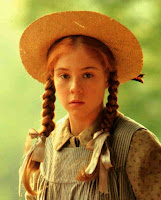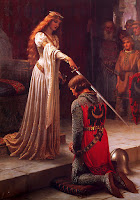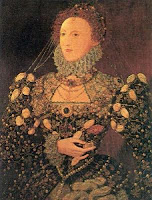As a redhead I've lived my life in a whirl of stereotypes - our tempers are hot; our sex drive is high; and did I mention we don't have souls? So I decided to put my journalistic skills to use and look into the myths/religious beliefs/weird customs behind the stereotypes that so desperately wish to define me.
In various times and cultures, red hair has been prized...feared...and ridiculed.
Works of literature have done their fair share of fostering the stereotypes surrounding red hair.
Let's start with the most famous of redheaded stereotypes: the fiery nature of our temperament.
 It is said of the redheaded heroine of Anne of Green Gables, Anne Shirley, that "her temper matches her hair."
It is said of the redheaded heroine of Anne of Green Gables, Anne Shirley, that "her temper matches her hair."Catcher in the Rye also pays homage to red hair when Holden Caulfield remarks, "People with red hair are supposed to get mad very easily..." But he goes on to disprove the stereotype by saying his late brother, Allie, had very red hair but never got angry.
Literature has also lent its helpful efforts to the belief that redheads are "highly sexed." For example, author Johnathan Swift puts a satirical spin on this particular convention in the fourth part of his book Gulliver's Travels, "A Voyage to the Country of the Houyhnhnms." He writes: "It is observed that the red-haired of both sexes are more libidinous and mischievous than the rest, whom yet they much exceed in strength and activity."
Katherine Brush's novel Red-Headed Woman embraces both of the above-mentioned stereotypes in the portrayal of its protagonist - a sexually aggressive home-wrecker who frequently throws violent temper tantrums.
And as a possible contributor to the original myths of temperament, the character of Achilles in Homer's The Illiad is described as having red hair.
Red hair has often been the subject of artists. This painting is called "Accolade". It was painted by Edmund Blair Leighton in 1901. It pictures a red-haired Lady Guiniviere knighting a young fighter, perhaps Lancelot.
This famous painting is "The Birth of Venus" by early Rennaissance painter Sandro Botticelli. It depicts the mythological goddess as a redhead.
Red hair can also be found in religious and mythological traditions. Red is the preferred dyeing color in Islam, and it is reported that the prophet Muhammad used henna to dye his hair red.
Esau, the twin brother of Jacob from 1 Samuel, is said to have been completely covered in red hair. Mary Magdalene is depicted as having flowing red hair in early artistic renderings (there is no mention of hair color in the Bible).
Thor of Norse mythology is portrayed as having red hair, and ancient Egyptians associated both red-haired people and red-colored animals with the god Set and considered them to be favored by the powerful and temperamental deity.
The popularity of red hair throughout history is touch and go. Queen Elizabeth I of England was a redhead, so during the Elizabethan Era red hair was viewed in a more favorable light.
In the Middle Ages, red hair and green eyes were thought to be the sign of a witch, werewolf or vampire. Montague Summers translated Malleus Maleficarum: "Those whose hair is red, of a peculiar shade, are unmistakably vampires."
Further translation reveals: "It is significant that in ancient Egypt, as Manetho tells us, human sacrifices were offered at the grave of Osiris, and the victims were red-haired men who were burned, their ashes being scattered far and wide by winnowing-fans. It is held by some authorities that this was done to fertilize the fields and produce a bounteous harvest, red-hair symbolizing the golden wealth of the corn. But these men were called Typhonians, and were representatives not of Osiris but of his evil rival Typhon, whose hair was red."
On a personal level I find this all fascinating, although I wish I had been able to find more information on the belief that redheads are soulless (other than references to that particular SouthPark episode). I don't much believe in stereotypes. I find them to be mostly generalizations that cannot be used to describe a particular group of people as a whole. Even if 99 of 100 people fits every known stereotype for their particular group, there is one person who proves them wrong, therefore rendering those stereotypes as just that: stereotypes.



.jpg)












Ginny Weasley fits this stereotype.
ReplyDelete